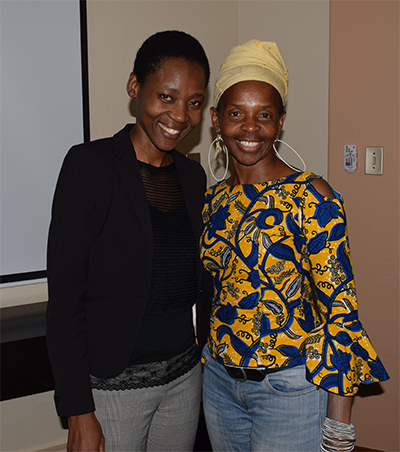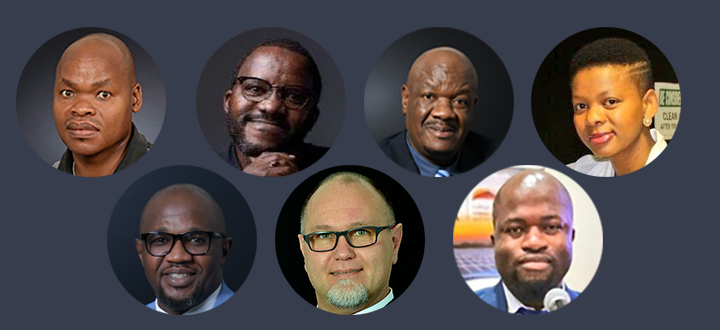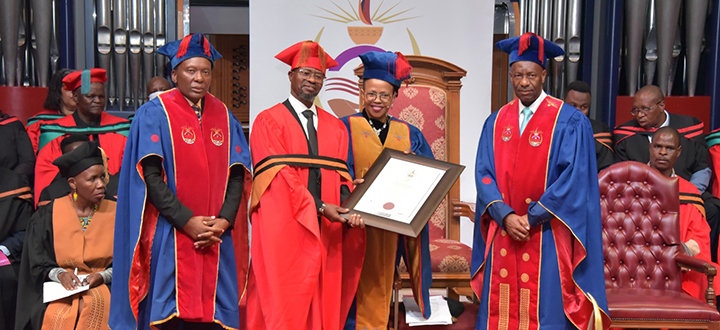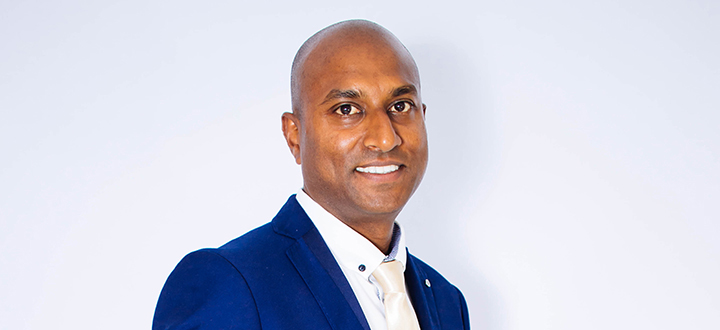College of Human Sciences
Reweaving the soul of the nation

Pictured are Prof Puleng Segalo (Head: CHS Research and Graduate Studies) and Mmatshilo Motsei (Author: Reweaving the soul of the nation).
“Reweaving is about rethinking our relationship with the environment and the way we treat the environment and others,” said Professor Puleng Segalo as she began a book discussion with author, Mmatshilo Motsei on her latest book, Reweaving the soul of the nation.
The book provokes one to transcend into understanding the depth of our environment and our relation to it in the form of short stories. Motsei wrote these essays during a time in isolation, where she observed that the way we relate to the self is an expression on how you relate to other people and the environment.
“The total disconnect that we embody as human beings, manifests how we relate to our surroundings”, she said, adding how the meaning of totems portray that our ancestors were nature conservationists. “We do not replenish and the way our ancestors related to the earth was that everything we take must be replaced but now we just take and not replace, which shows us how broken and disconnected we are.”
The thread in the book encourages people to use their indigenous knowledge systems; she challenges people to think about what they mean when they say education, because education is formal education, which in essence is western education. She said indigenous knowledge is the binary opposite of western education because we do not have any other way to explain our education because we are dispossessed.
“If you do not have a strong will, there comes a time when someone is going to offer you something you cannot refuse, there are many ways in which we prostitute ourselves because prostitution comes in many forms. In this unequal, capitalist and corrupt world there is a chance that we will be forced to sell something at one point.”
She spoke on how we are still beggars in the market, economy and all other aspects, and rather the conversation should be about the ways in which we can embrace our power. She emphasised the erosion is going to continue because we are interested in the external, and we are becoming the effective agents of capital and capitalists succeeds in inequality.
“Poverty is the worst form of violence; we have killed people’s capacity to think for themselves,” she said, asserting that education begins at the time of conception. “You are educated because of the woman carrying you, she is your first teacher and the kind of life she is living will determine the quality of teaching. Poverty hinders education by causing these women to have limited learning experiences and access to education.”
She added that progress in education has become about ticking boxes and not about human progress, and said that we should focus on other forms of education and we can teach from anywhere. She concluded the discussion by stating that going forward we need to find a way to create a new nation.
*By Nomshado Lubisi (CHS communications and marketing)
Publish date: 2018-04-18 00:00:00.0

 Young Unisa science stars join elite Lindau Nobel Laureate group
Young Unisa science stars join elite Lindau Nobel Laureate group
 Education MEC addresses Unisa autism seminar
Education MEC addresses Unisa autism seminar
 Seven Unisans nominated for the NSTF-South32 Awards 2023/2024
Seven Unisans nominated for the NSTF-South32 Awards 2023/2024
 Unisa awards posthumous honorary doctorate to literary maven, OK Matsepe
Unisa awards posthumous honorary doctorate to literary maven, OK Matsepe
 From humble beginnings to academic leadership
From humble beginnings to academic leadership